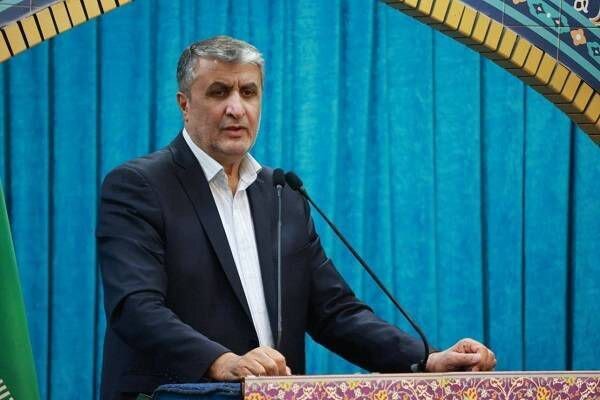TEHRAN – Iran’s top nuclear official says the country’s nuclear capabilities have matured into strategic assets despite years of Western opposition and pressure aimed at restraining this technological advancement.
During Friday’s prayer in Tehran, Mohammad Eslami, head of Iran’s Atomic Energy Organization (AEOI), said the Western countries were aiming to monopolize nuclear technology and consistently tried to thwart Iran’s progress on the ground.
“They set up any redlines in the area, but we’re moving beyond those limits,” Eslami said. “Iranian nuclear science is no longer just a technical achievement. It has become a symbol of the will of the people and is deeply embedded in the spirit and resolve of our people.”
Eslami criticized the West’s refusal to accept an independent Iran on an equal footing with global forces, saying its repeated attempts to thwart Iran’s nuclear program ultimately failed.
“All of their hostile efforts, such as sabotage and obstruction, had no consequences,” he said. “And by God’s grace they will never do that.”
The nuclear chief also revealed that more than 30 countries have expressed interest in acquiring Iran’s nuclear products, highlighting the international demand for the country’s peaceful nuclear advancement.
Despite the agency’s obligation to promote the use of private nuclear energy, Eslami targeted the United States to put pressure on the International Atomic Energy Agency (IAEA) to prevent it from supporting Iran’s peaceful nuclear efforts.
“Iran has been tested more by the IAEA than any other country,” he pointed out. “However, the Western government is falsely claiming that we are not cooperating or have not hidden our activities yet.”
He also said that every time Iran approaches an agreement with a foreign partner to build a nuclear power plant, Western pressures will force him to withdraw from the deal. In response, Iran is currently planning to build a domestically produced nuclear power plant that has been fueled to Iran’s resources.
“To keep our enemies in place, we will build a fully Iranian nuclear power plant, where it is designed, built and fueled at home,” Eslami says.
Despite the rise in sanctions and external challenges, Iran continues to make significant progress in peaceful nuclear development. As an early signatories of the Nuclear Non-Proliferation Treaty (NPT), Iran maintains regular involvement with the IAEA.
Rafael Grossi, the agency’s director, is scheduled to visit Tehran later this month.

